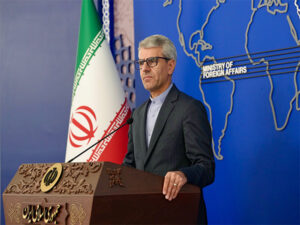International Court of Justice to hold hearings on legality of Israel’s occupation of Palestinian territories
The Hague [Netherland], February 19 (ANI): The International Court of Justice (ICJ) is preparing to commence historic hearings on the legality of Israel’s 57-year occupation of Palestinian territories. Scheduled for a week at The Hague, the proceedings coincide with Israel’s ongoing military offensive in Gaza, resulting in the death of over 29,000 Palestinians since October 7, Al Jazeera reported.
Distinct from the genocide complaint filed by South Africa against Israel for alleged violations in the current conflict, the ICJ hearings focus on Israel’s occupation of the West Bank, Gaza, and East Jerusalem since 1967.
The Palestinians, seeking these areas for an independent state, argue that the occupation breaches three fundamental principles of international law, as reported by Al Jazeera.
Palestinian representatives assert that Israel has violated the prohibition on territorial conquest by annexing significant portions of occupied land, infringing upon the Palestinians’ right to self-determination, and imposing a system of racial discrimination and apartheid.
Omar Awadallah, head of the UN organisations department in the Palestinian Foreign Ministry, emphasises the desire for the court to consider the term “apartheid,” similar to its evaluation of “genocide” in the South Africa case.
An advisory opinion from the court is anticipated to provide the Palestinians with legal tools to address the alleged illegalities of the occupation through peaceful international law methods. The court’s ruling is expected to take months.
Following the Palestinian presentation, an unprecedented 51 countries and three organisations–the League of Arab States, the Organisation of Islamic Cooperation, and the African Union–will address the judges. While Israel will not present an oral argument, it has submitted written observations.
The case reached the ICJ after the UN General Assembly voted in December 2022 to seek a non-binding advisory opinion on the Israeli occupation from the 15-judge panel. This request, championed by Palestinians and contested by Israel, prompted strong objections from the latter, which deemed any potential decision from the court as “completely illegitimate.”
Israel captured the West Bank, East Jerusalem, and Gaza in 1967 during a war with Egypt, Jordan, and Syria. While Israel withdrew from Gaza in 2005, it still controls the enclave’s borders. In the West Bank, 146 settlements house over 500,000 Jewish settlers, with a settler population growth exceeding 15 per cent in the last five years, according to Peace Now. Israel has also annexed East Jerusalem, considering the entire city as its capital.
The international community widely regards the settlements as illegal, and Israel’s annexation of East Jerusalem is not internationally recognised. This case marks the second time the UN General Assembly has sought an advisory opinion from the ICJ on the occupied Palestinian territory, following a 2004 ruling that declared Israel’s separation wall in the West Bank violated international law, Al Jazeera reported.






